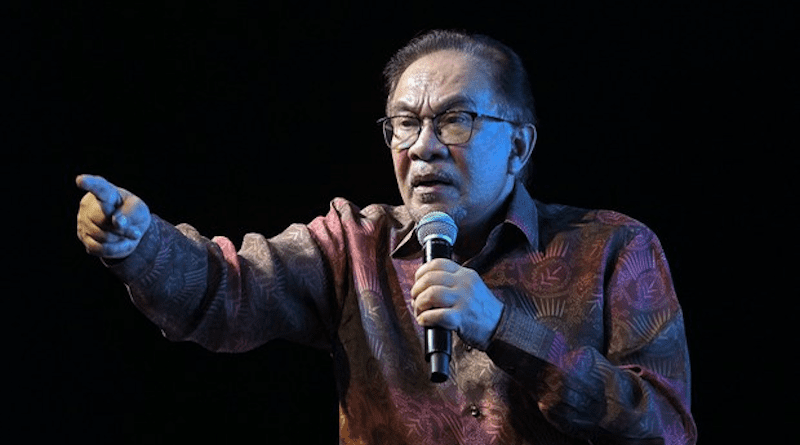A Dose Of Reality For Malaysia: Will Anwar Become Next Victim Of The ‘Messiah Effect?’ – Analysis
With Anwar Ibrahim becoming Malaysia’s 10th prime minister, he now faces an avalanche of expectations. Many see him as a messiah, come to fix the problems facing the country, one heading into uncertain economic times with rising inflation, a falling ringgit and depressed economic buoyancy fed by a looming world economic slowdown.
Malaysia has been long embroiled in race-based politics and religious bigotry, which has gestated hate within the community. A large section of the population want to retain their special privileges, while the government must look for new ways to raise revenue without putting undue income stress on the bottom 40 percent of the income-earning population.
On top of that, over the next five years, the term under the country’s parliamentary system, Anwar must hold together a political coalition made up of long traditional adversaries, with differing ideologies and electoral stakeholders.
The education system is broken, bloated with vested interests and not creating the type of graduates needed to drive the economy. The heavy emphasis on Islam within education is driving Malaysia towards isolationism. The civil service is a government within itself, often hostile towards the executive, more loyal to its long association with the United Malays National Organization than any reformers, as Pakatan Harapan in its previous incarnation learned to its sorrow.
The media is positioning Anwar as a messiah, who will be able to undertake a ‘quick fix’ to solve all of Malaysia’s problems. This is the messiah effect, which we saw in the United States in 2008 when Barak Obama ran for the presidency. Obama represented the opposite to what then incumbent George Bush represented, and the people voted Obama in overwhelmingly.
This was Obama’s great disadvantage. With so many expectations laid upon him, it was almost impossible for him to live up to peoples’ expectations.
This is a grave political danger. So, we must ask, what is Anwar bringing with him to office?
Ever since his student days, Anwar has dealt in expectations. After his sacking as deputy prime minister under Mahathir Mohamed in 1998, the ‘Reformasi’ movement was one of expectation. ‘Reformasi’ became the Malaysian dream of creating a multiracial society based upon fairness equity, and justice. When Anwar was jailed, some equated his career with that of the late Nelson Mandela, the great reformer and Nobel Prize winner of South Africa.
Anwar’s Pakatan Rakyat and later Pakatan Harapan was a coalition of expectation. Many felt that Merdeka had recurred with Pakatan’s surprise win in 2018. However, voters were very quickly disappointed with Pakatan’s performance, with their anger shown in by-elections.
This is the danger for Anwar and his government. There are too many high expectations placed upon him. He has always been a first-class orator and is able to tell audiences what they want to hear. He has long been motivated to become prime minister. He has firmly believed this was his destiny.
However, Anwar now has to turn rhetoric, ambition, and his ideas into action. His ability to do this is a great unknown. From what we saw with the Obama administration, it certainly is not an easy thing to do.
Anwar can’t talk about ideas anymore. He must implement them. His style of pragmatic compromise may not work when firm decisions that may be unpopular are required to be made.
The 75-year-old prime minister-elect will be quickly tested when it comes to national reconciliation. Catalyzing any shift from race- and religious-based narratives towards multiculturalism will be his greatest challenge. It is said that the knives are already out, with forces attempting to undo the unwieldy ruling coalition put together at the behest of the Agong, Malaysia’s king.
Education reform will be almost insurmountable, with deeply embedded vested interests throughout the system, as will reform be with the civil service. He will have to deal with corruption without breaking apart his own coalition, with bloated government-linked companies headed by UMNO cadres dominating the economy. “The role those state-owned enterprises (SOEs) or, more generally, government-linked companies (GLCs) play in the Malaysia economy is widespread and pervasive,” according to a 2017 Asian Development Bank study. “In terms of countries that have the highest SOE presence among their largest firms, Malaysia ranks fifth highest in the world.
Other areas where Anwar may fear to tread may include the 2017 disappearance of Raymond Koh Keng Joo, a Christian pastor who was last seen in the custody of the Royal Malaysia Police’s Special Branch, according to an investigation by the Human Rights Commission of Malaysia. There is also the case of Altantuya Shaariibuu, one of the country’s most notorious. The then-28-year-old Mongolian international party girl was proven to have been murdered by two of former Prime Minister Najib Razak, both of whom have said Najib ordered the murder.
The new government is already one that is based upon breaches of principle. The very founding of Anwar’s government has compromised what Pakatan fought against. It fought against political corruption, and now has its old nemesis UMNO as a coalition partner. UMNO is an important partner within the coalition and the question here is how much Pakatan will have to compromise on principle to keep political peace, especially with UMNO trying to keep its so-called “court cluster” of indicted politicians out of jail, and to free Najib, the party’s financier and kingmaker, We must hope the public doesn’t become quickly dissatisfied.
Originally published in Asia Sentinel 28th November 2022

